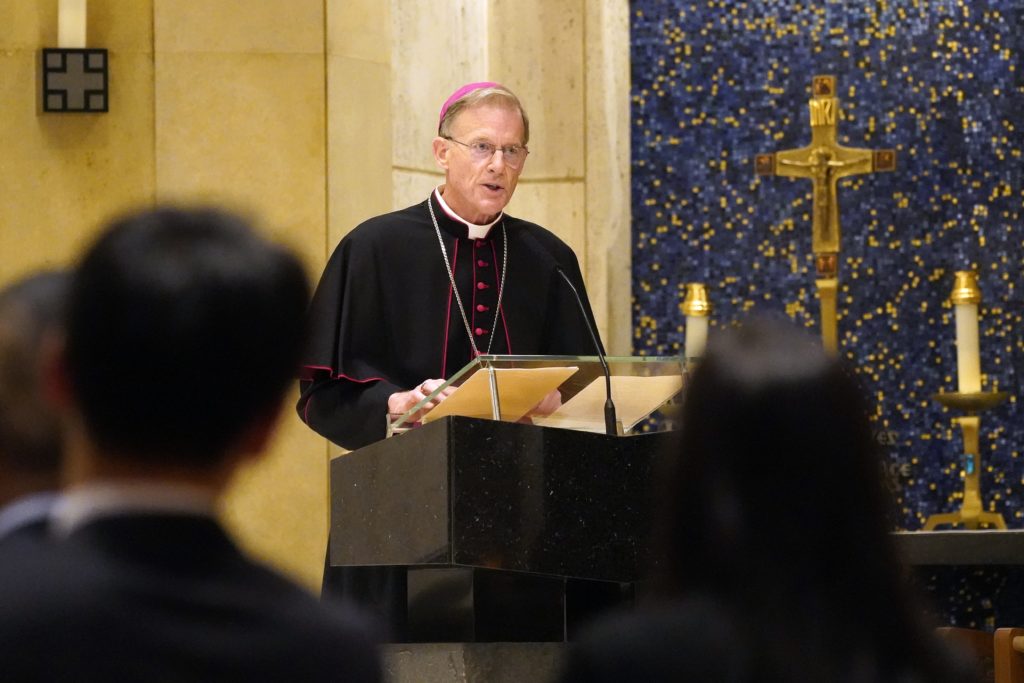For Archbishop John Wester of Santa Fe the passage of a state constitutional amendment to create a permanent fund for early childhood education was a long time coming. It’s something New Mexico’s bishops have endorsed for more than a decade.
“Today, New Mexico sees a brighter future because of the commitment that New Mexicans have made to the health and well-being of our children and families,” Wester said in a Nov. 8 statement.
Amendment 1, now officially a part of the New Mexico constitution, commands a small percentage of the state’s Land Grant Permanent Fund, also known as the Permanent School Fund, and directs it towards early childhood education. The Land Grant Permanent Fund holds the money New Mexico gets from oil and gas leases.
New Mexico is the first state to guarantee the right of early childhood education.
Before Amendment 1 passed, five percent of the fund was withdrawn annually for the state’s public schools, universities, hospitals, and other beneficiaries. That sum was $836.5 million in Fiscal Year 2021, according to the state, and is usually over three-quarter of a billion dollars.
Amendment 1 tacks on another 1.25 percent to that five percent for early childhood education, which would amount to about $140 million annually.
Part of the money is likely to go towards home visiting programs, where nurses, social workers or child development specialists visit home to support parents raising babies and young children. Wester said these programs are especially important.
“I am especially optimistic about the positive impact home visiting will continue to have on women from prenatal through delivery on infants and toddlers; a journey that is accompanied by referral to resources and deliverance of evidence-based curriculum which will make all of the difference in their lives,” Wester said.
The archbishop added that he is “pleased that there is a component in the amendment that ensures the family is connected to housing, food security, and opportunities for employment.”
70 percent of New Mexicans voted in favor of Amendment 1.
Opponents of the measure argue that the additional funds aren’t needed because the state already has a trust fund dedicated to early childhood education, and that increasing the annual distribution would mean less money for New Mexico children than if the pre-existing five percent rate was left intact, according to the Albuquerque Journal.
Wester, though, in his argument why the amendment’s passage was important highlighted that New Mexico is at the bottom of all of the well-being indicators for children; a fact that he said New Mexicans showed they will no longer accept with their vote.
The Annie E. Casey Foundation ranked New Mexico last in the overall child well-being portion of its 2022 KIDS COUNT Data Book. According to the report, 56 percent of children ages three and four in New Mexico are not in school, 20 percent of children live in high-poverty areas, and 34 percent of children’s’ parents lack secure employment.
The Annie E. Casey Foundation is an organization that is “devoted to developing a brighter future for millions of children and young people with respect to their educational, economic, social and health outcomes,” according to its website. It publishes the data book annually.
The group New Mexico Voices for Children first proposed the idea to tap into the Land Grant Permanent Fund to fund early childhood education in 2011. In a statement, the organization said Amendment 1 passing “puts children and families on the path to a bright future.”
Re-elected New Mexico Gov. Michelle Lujan Grisham touted the constitutional amendment on the campaign trail as building “the strongest foundation for New Mexico families and kids.”
Wester congratulated legislators for both passing Amendment 1 and getting it on the ballot.
“With prayers of gratitude, I am thankful for the advocacy efforts of all who participated in this decade-long campaign,” Wester said.

